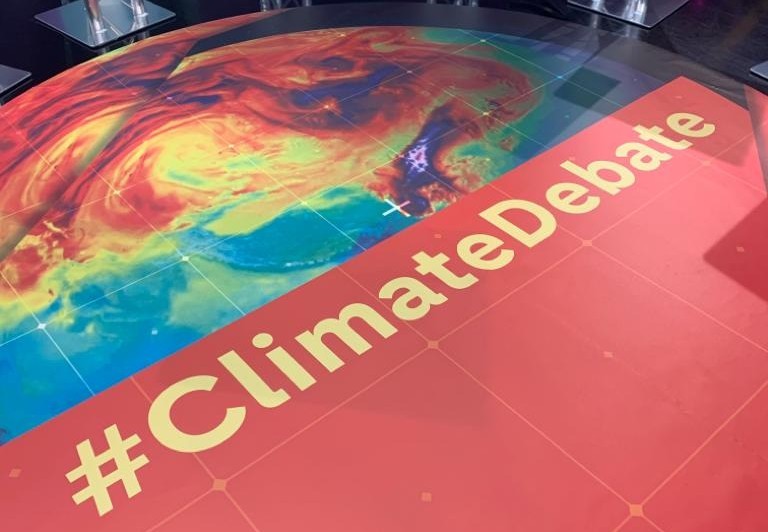The leaders of five of the UK’s political parties went head to head last Thursday, in the UK’s first ever climate debate.
The leaders of the Labour Party, Scottish National Party, the Green Party, the Liberal Democrats and Plaid Cymru convened for the debate, which was focused solely on climate and environment on Channel 4.
The Conservatives and the Brexit Party leaders were both also invited, but did not participate.
Throughout the debate, there was a consensus among the leaders of the importance of action on climate change, although the parties did not agree on all the elements of their individual pathways to achieving net zero emissions.
Net zero – but by when?
Chiefly among discussions was the date at which to reach net zero emissions, for which the parties have various targets.
Labour leader Jeremy Corbyn was accused by Green Party co-leader Sian Berry of “weaken[ing]” the target of 2030, a motion for which was passed at Labour’s party conference but was changed in the manifesto to a goal of being “on track” to reach net zero in the 2030s.
Corbyn refuted the claim, stating: “We’re not weakening it, we’re not giving up on it. I’m determined to achieve it, that’s why I’ve put that in our manifesto.”
“We have to do everything we can to get to a 2030 net zero emissions target and we do that by investment in green energy jobs, solar, wind and wave power, and we do that by creating jobs in transforming our energy consumption by retrofitting our homes to make them environmentally sustainable,” he said.
Liberal Democrat leader Jo Swinson was also questioned as to why the Lib Dems target – net zero by 2045 – wasn’t as ambitious as other parties. Swinson refuted the idea, saying it is “absolutely possible to do this by 2045” but that “we should do it as quickly as we can and bring that date forward”.
As the discussion became heated, Nicola Sturgeon, leader of the SNP emphasized the importance of a coordinated approach, a viewpoint reflected by an open letter from the energy industry sent the parties yesterday calling for a post-election pact and unified thinking.
“I don’t think it’s helping the planet that much for us all to be squabbling with each other here. This is something we should actually be trying to find unity and common purpose on,” Sturgeon said.
Plaid Cymru’s leader Adam Price turned the heat on the other parties, stating that “we have the technology now to reach carbon neutrality by 2030, unfortunately what’s lacking is the political will”.
A place for nuclear
Whilst there was little in-depth discussion of individual policies, likely due to there only being an hour allocated for the debate and a wealth of topics to discuss, but one key one was the parties support and opposition for nuclear power.
Sturgeon said that as offshore wind now comes in at half the price of nuclear, there is no need to still be supporting new nuclear and she doesn’t “know why Labour and the Tories are still supporting new nuclear power”.
She also criticised the Conservatives for “disgracefully” removing support for onshore wind.
“These technologies are here now and we have to do more to support them,” she said.
Corbyn agreed that offshore wind is a “huge opportunity” that must be planned for, invested in and the jobs to produce it ensured.
However, when questioned by Sturgeon as to why Labour supports nuclear, Corbyn said there has to be a “baseline of production of electricity from a totally sustainable source”.
Berry hit back that this was “very old thinking”, pointing to domestic and long-duration storage as solutions.
Analysis: Alice Grundy, junior reporter, Current±
Watching two ice sculptures with the name of the Conservative and Brexit parties slowly drip onto the floor of a Channel 4 studio can’t have been a celebrated moment in their respective campaign HQs. Climate is being billed as one of the deciding issues of this election, and none could argue that this wasn’t an effective, or rather harrowing, visual display.
But for the rest of us, seeing the leaders of five of the biggest parties in the UK come together – albeit with some differing of opinions and no shortage of scathing comments – to lay out their policies for combating climate change was a momentous occasion.
While talk may have occasionally slipped to Brexit, hedgehogs and Adam Price’s son’s reusable nappies, the leaders were clear about one thing: now is the moment to solve the climate emergency, and here are our plans to do it.
There may not have been excessive detail on some of the topics, but it’s worth remembering these debates are for the general public, not the experts alone, and any detail there is can be found in the manifestos themselves.
The party leaders were also quizzed on their policies for issues such as farming, particularly Price due to Wales’ large farming industry, as well as topics such as tree planting and aviation.
Corbyn described the climate movement as having “changed our politics forever” and warned that this election is “our last chance to tackle the climate and environment emergency”.
An un-televised debate on Wednesday between representatives of the parties and organised by The Aldersgate Group also saw a heavy focus on net zero targets and onshore wind. The Conservatives’ Kwasi Kwarteng defended the party’s position on onshore wind, but described it as “an ongoing issue” that is something the party will “absolutely” be “focused on” if re-elected.
The General Election takes place on 12 December, with registrations to vote now closed.






